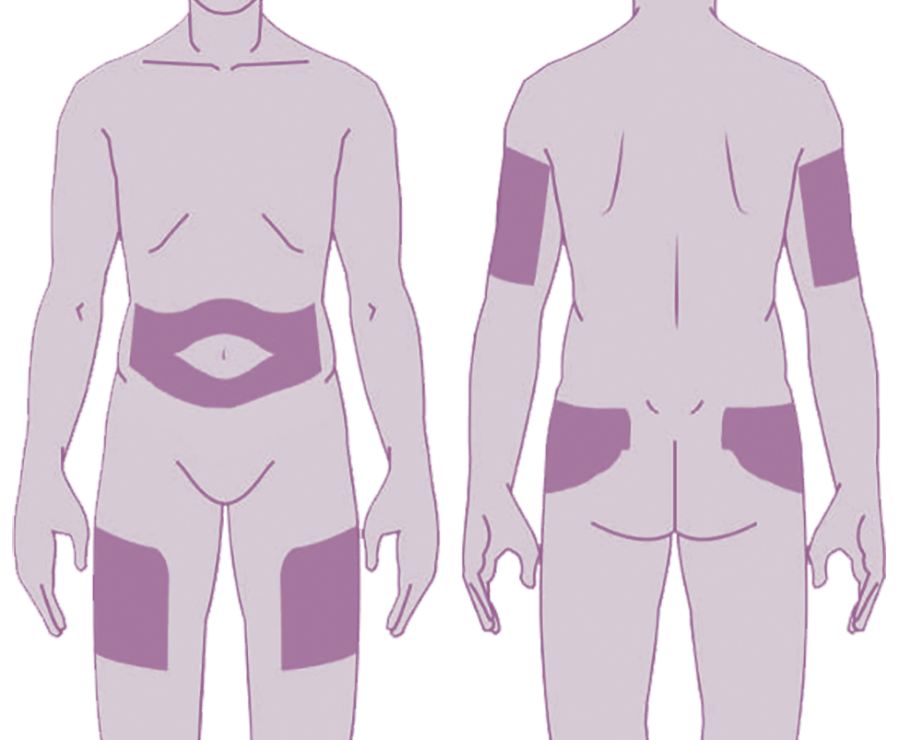IMPORTANT SAFETY INFORMATION
What is the most important information I should know about BRIXADI?
- Because of the serious risk of potential harm or death from self-injecting BRIXADI into a vein (intravenously), it is only available through a restricted program called the BRIXADI Risk Evaluation and Mitigation Strategy (REMS) Program.
- BRIXADI is not available in retail pharmacies.
- Your BRIXADI injection will only be given to you by a healthcare provider.
- BRIXADI (buprenorphine) extended-release injection for subcutaneous use contains a medicine called buprenorphine. Buprenorphine is an opioid that can cause serious and life-threatening breathing problems, especially if you take or use certain other medicines or drugs.
- Talk to your healthcare provider about naloxone. Naloxone is a medicine that is available to patients for the emergency treatment of an opioid overdose. If naloxone is given, you must call 911 or get emergency medical help right away to treat an overdose or accidental use of an opioid.
- BRIXADI can cause serious and life-threatening breathing problems. Get emergency help right away if you:
- feel faint
- feel dizzy
- are confused
- feel sleepy or uncoordinated
- have blurred vision
- have slurred speech
- are breathing slower than normal
- cannot think well or clearly
- Do not take BRIXADI with certain medicines. Taking BRIXADI with other opioid medicines, benzodiazepines, alcohol, other central nervous system depressants (including street drugs) can cause severe drowsiness, decreased awareness, breathing problems, coma, and death.
- In an emergency, have family members tell the emergency department staff that you are physically dependent on an opioid and are being treated with BRIXADI.
- You may have detectable levels of BRIXADI in your body for several months after stopping treatment with BRIXADI.
Do not receive BRIXADI if you are allergic to buprenorphine or any ingredients in BRIXADI:
- BRIXADI weekly: anhydrous ethanol, soybean phosphatidylcholine, glycerol dioleate
- BRIXADI monthly: N-methylpyrrolidone, soybean phosphatidylcholine, glycerol dioleate
Before receiving BRIXADI, tell your healthcare provider about all of your medical conditions, including if you have:
- Trouble breathing or lung problems
- A curve in your spine that affects your breathing
- Addison’s disease
- An enlarged prostate (men)
- Problems urinating
- Liver, kidney, or gallbladder problems
- A history of alcoholism
- A head injury or brain problem
- Mental health problems
- Adrenal gland or thyroid gland problems
- A latex allergy. The BRIXADI needle cap contains latex.
Tell your healthcare provider if you are:
- pregnant or plan to become pregnant. If you receive BRIXADI while pregnant, your baby may have symptoms of opioid withdrawal at birth that could be life-threatening if not recognized and treated. Talk to your healthcare provider if you are pregnant or become pregnant.
- breastfeeding. BRIXADI can pass into your breast milk and may harm your baby. Talk to your healthcare provider about the best way to feed your baby during treatment with BRIXADI. Monitor your baby for increased drowsiness and breathing problems if you breastfeed during treatment with BRIXADI.
Tell your healthcare provider about all the medicines you take, including prescription and over-the-counter medicines, vitamins and herbal supplements. Talk with your healthcare provider before starting any new medicines during or after stopping treatment with BRIXADI.
What should I avoid while receiving BRIXADI?
- Do not drive, operate heavy machinery or perform any other dangerous activities until you know how BRIXADI affects you. BRIXADI can cause drowsiness and slow reaction times. BRIXADI can make you sleepy, dizzy, or lightheaded. This may happen more often in the first few days after your injection and when your dose is being changed.
- You should not drink alcohol or use prescription or over-the-counter medicines that contain alcohol during treatment with BRIXADI, because this can lead to loss of consciousness or even death.
What are the possible side effects of BRIXADI?
BRIXADI can cause serious side effects, including:
- Trouble breathing. Taking BRIXADI with other opioid medicines, benzodiazepines, alcohol, or other central nervous system depressants can cause breathing problems that can lead to coma and death.
- Sleepiness, dizziness, and problems with coordination.
- Physical dependence or abuse.
- Liver problems. Call your healthcare provider right away if you notice any of these symptoms:
- your skin or the white part of your eyes turns yellow (jaundice)
- dark or “tea-colored” urine
- light-colored stools (bowel movements)
- loss of appetite
- pain, aching, or tenderness on the right side of your stomach area
- nausea
Your healthcare provider should do tests to check your liver before and during treatment with BRIXADI.
- Allergic reaction. You may have a rash, hives, swelling of your face, wheezing, light-headedness when changing positions, feeling faint, or loss of consciousness. Call your healthcare provider or get emergency help right away.
- Opioid withdrawal. Call your healthcare provider right away if you get any of these symptoms:
- shaking
- sweating more than normal
- feeling hot or cold more than normal
- runny nose
- watery eyes
- goose bumps
- diarrhea
- vomiting
- muscle aches
These symptoms may start weeks to months after your last dose of BRIXADI. Tell your healthcare provider if you develop any of these symptoms.
- Decrease in blood pressure. You may feel dizzy if you get up too fast from sitting or lying down.
- The most common side effects of BRIXADI include: injection site pain, headache, constipation, nausea, injection site redness, injection site itching, trouble sleeping (insomnia), and urinary tract infection.
BRIXADI may affect fertility in males and females. Talk to your healthcare provider if this is a concern for you.
These are not all the possible side effects of BRIXADI. Call your healthcare provider for medical advice about side effects.
You are encouraged to report negative side effects of prescription drugs to the FDA. Visit www.fda.gov/medwatch or call 1-800-FDA-1088.
For more information about BRIXADI, ask your healthcare provider or go to www.BRIXADI.com or call 1-833-274-9234.
This information does not take the place of talking with your healthcare provider for medical advice about your condition or treatment.
Please see BRIXADI Medication Guide and Full Prescribing Information, including BOXED WARNING.





